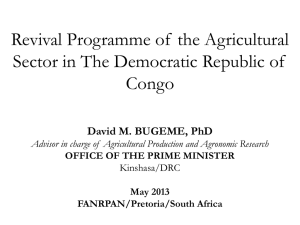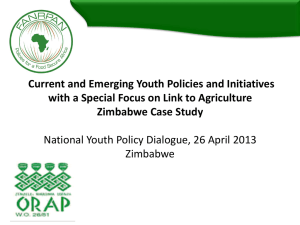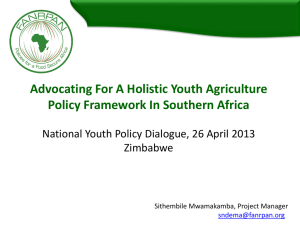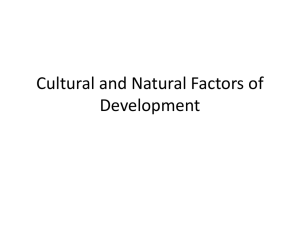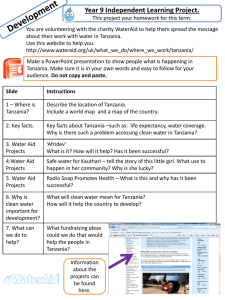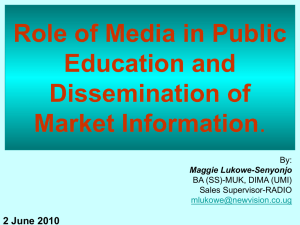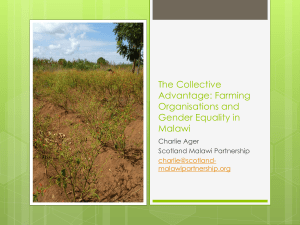Malawi Dialogue 24 April 2013
advertisement
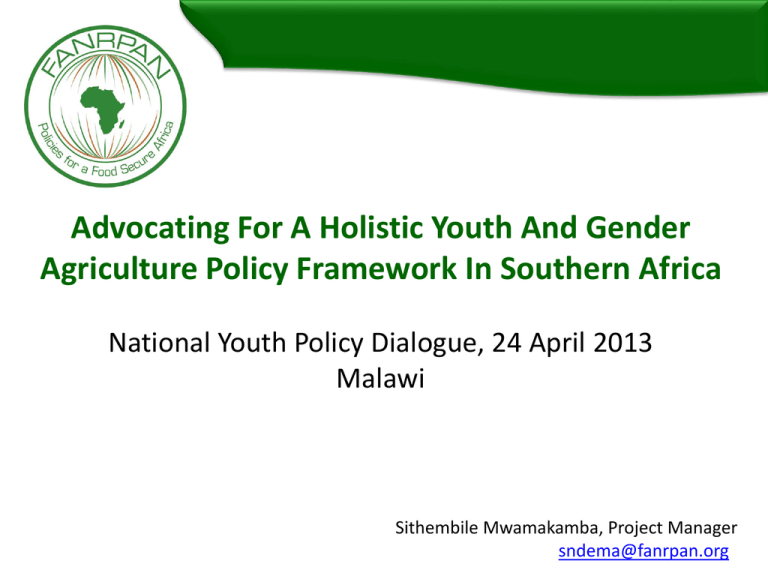
Advocating For A Holistic Youth And Gender Agriculture Policy Framework In Southern Africa National Youth Policy Dialogue, 24 April 2013 Malawi Sithembile Mwamakamba, Project Manager sndema@fanrpan.org Presentation Outline 1. The FANRPAN Policy Cycle 2. Overview of youth engagement in agriculture in Southern Africa 3. Background on FANRPAN’s work on engaging youth in agriculture policies 4. Why we are here today Food, Agriculture and Natural Resources Policy Analysis Network (FANRPAN) www.fanrpan.org Unpacking the FANRPAN Policy Engagement Cycle 3 Capacity development 2 1 Strategic Knowledge partnerships generation Key components What we do in this areas • Generate knowledge through policy analysis and research • Acquire knowledge through engagements at local, national, regional and global levels • Mobilize Strategic partnerships to generate policy evidence and to mentor • Forge partnerships for advocacy • Coordinate the implementation of the collaborative engagement. • Analytical capacities and knowledge base of policy implementers enhanced. • Mentoring and career development (e.g. Nodes, Youth through Internships, Msc and PhD thesis) • Equip actors with relevant tools and terminology they need to effectively engage with one another (e.g. TPA) • Journalists training for responsive, relevant reporting and Food, Agriculture and Natural Resources Policy Analysis Network (FANRPAN) www.fanrpan.org reaching wider audients FANRPAN Policy Engagement Cycle (cont’d) 4 Policy Advocacy • • Policy advocates capacitated (e.g. Elders, Champions and Advocates) Advocacy engagement at local, national, regional and global levels (e.g. UNFCCC-Cop, AU, COMESA, Montpellier panel etc.) Promote change in Knowledge, Attitude and Skills (KAS) · Documentation of processes and lessons learned · Harvesting and consolidation of dispersed existing knowledge assets · Monitoring, evaluation and learning (e.g. reviews, common vision retreats, exchange visits, reflection meetings etc.) • • 5 Knowledge management and communication Safe space and legitimate convening power of multistakeholder policy dialogues · Dissemination policy briefs, www.fanrpan.org publications, social media Food, Agriculture and Natural Resources Policy Analysis Network (FANRPAN) and other means Youth and Agriculture in Southern Africa • Africa is the world’s youngest continent, • In 2010, 70 % of the region’s population was under the age of 30, • In 2010, 20 % of the population were young people between the ages of 15 to 24. • The large majority of the youth lives in rural areas and mostly employed in agriculture, accounting for 65% of total employment. Food, Agriculture and Natural Resources Policy Analysis Network (FANRPAN) www.fanrpan.org Regional Efforts in Creating Youth Policies • NEPAD Youth Desk – Launched in 2005 by New Partnership for Africa’s Development (NEPAD) to give youth a platform for dialogue and enable them to contribute to policy debates. • The African Youth Charter – Adopted July 2006 at the 7th Ordinary Session of the Conference of Heads of States and Government – Lays the pedestal for national programmes and strategic plans for Youth empowerment • Youth Decade Plan of Action (2009-2018) – Declared by the African Union Assembly in January, 2009, Addis Ababa, Ethiopia. – Framework for multi-sectoral and multidimensional engagement of all stakeholders towards the achievement of the goals and objectives of the African Youth Charter. Food, Agriculture and Natural Resources Policy Analysis Network (FANRPAN) www.fanrpan.org Status of the African Youth Charter Food, Agriculture and Natural Resources Policy Analysis Network (FANRPAN) www.fanrpan.org Youth Charter and Agriculture Article 14: Poverty Eradication and Socio-economic Integration of Youth • Train young people to take up agricultural, mineral, commercial and industrial production using contemporary systems and promote the benefits of modern information and communication technology to gain access to existing and new markets; • Facilitate access to credit to promote youth participation in agricultural and other sustainable livelihood projects Food, Agriculture and Natural Resources Policy Analysis Network (FANRPAN) www.fanrpan.org Article 12: National Youth Policy • State Parties shall obliged to develop a comprehensive and coherent national youth policy as follows: – The policy shall be cross-sectoral in nature considering the interrelatedness of the challenges facing young people; – The development of a national youth policy shall be informed by extensive consultation with young people and cater for their active participation in decision-making at all levels of governance in issues concerning youth and society as a whole; – The policy shall advocate equal opportunities for young men and for young women; Food, Agriculture and Natural Resources Policy Analysis Network (FANRPAN) www.fanrpan.org FANRPAN’s Youth In Agriculture Work • September 2011 – FANRPAN convenes a Regional High Level Multi-stakeholder Food Security Policy Dialogue on “Advocating for the Active Engagement of the Youth in the Agricultural Value Chain” Food, Agriculture and Natural Resources Policy Analysis Network (FANRPAN) www.fanrpan.org Background • November 2011 FANRPAN commissioned case studies in Malawi, Mauritius, South Africa, Swaziland, Tanzania and Zimbabwe to assess current and emerging youth policies and initiatives with a special focus on links to agriculture. Evodius Rutta Executive Director TAYEN Tanzania Nawsheen Hosenally Agriculture Graduate Mauritius Food, Agriculture and Natural Resources Policy Analysis Network (FANRPAN) Calvin Kamchacha Executive Director FAFOTRAJ Malawi Obert Mathivha Executive Director CAYC South Africa www.fanrpan.org Mduduzi Dlamini President Swazi Youth in AgriBusiness Swaziland Tavaka Nyoni Consultant ORAP Zimbabwe Study Objectives • Establish baseline data on youth policies and initiatives currently in place in the case study countries. • Identify gaps and opportunities for developing national youth and agriculture policies within agricultural sector and make appropriate policy decisions. • Investigate the current participation level and coverage of rural and urban youth in agriculture and their perceptions towards the sector • Investigate and assess how the key institutions as well as current tools, and mechanisms and policy instruments available have mainstreamed youth agenda • Profile investment opportunities for youth engagement in the agricultural value chains Food, Agriculture and Natural Resources Policy Analysis Network (FANRPAN) www.fanrpan.org Methodology COUNTRY DESK REVIEW KEY INFORMANT INTERVIEWS FOCUS GROUP ON LINE DISCUSSIONS FORUM DISCUSSIONS SURVEYS MAURITIUS SOUTH AFRICA SWAZILAND ZIMBABWE MALAWI TANZANIA Food, Agriculture and Natural Resources Policy Analysis Network (FANRPAN) www.fanrpan.org 2012 FANRPAN High Level Food Security Policy Dialogue, Tanzania The theme was “From Policy to Practice: Advocating for the Active Engagement of Youth in Agriculture Value Chains”. • 253 delegates • 23 countries • Presentation of six country case study findings to a regional audience • Launch of the Youth in Agriculture Award H.E. Dr Jakaya Mrisho Kikwete, President of the Republic of Tanzania Food, Agriculture and Natural Resources Policy Analysis Network (FANRPAN) www.fanrpan.org Disseminating the Findings • September 2012: USAID support in disseminating case study findings at national level • Three national dialogues (South Africa, Swaziland, Mauritius) have been conducted to date • Expansion of project to: – – – – Angola, Lesotho, Mozambique and Zambia Food, Agriculture and Natural Resources Policy Analysis Network (FANRPAN) www.fanrpan.org Nothing for the Youth Without the Youth Food, Agriculture and Natural Resources Policy Analysis Network (FANRPAN) www.fanrpan.org Thank You Food, Agriculture and Natural Resources Policy Analysis Network (FANRPAN) www.fanrpan.org
